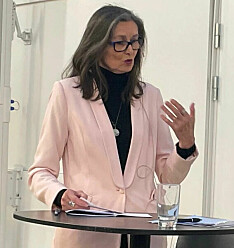
The media almost never write about age discrimination
Older workers are very rarely mentioned in the press. To the extent that they do appear, they are most often about happy outcomes. Very few articles are about negative events or bad attitudes towards the elderly.
Media researcher Nanna Alida Grit Fredheim at Kristiania University College has studied how independent Norwegian news media refer to older workers.
“In general, we know that older people’s absence in media is glaring. Other surveys have shown that the media very rarely interview older people,” Fredheim says.
This is a trend that has continued, she can now conclude.
Articles about older workers have not become more popular. Even less is written about the topic today than before, as shown by a comparison Fredheim has made of previous surveys from 2009.
Not in social media, either
She has also looked at social media.
Older people are, to a very small extent, used by advocacy and news organisations to draw attention to older workers, she finds.
Out of more than 100,000 entries, a total of only ten mentioned older workers.
The survey was carried out on behalf of the Centre for Senior Policy and looks at the period from 2019–2021. The media coverage was mapped using the media archive Retriever.
But the challenges are there
Only 5 per cent of news reports refer to legal conflicts in working life related to age.
"Seniors are a resource", for example, is the headline in a number of comments in several media outlets. Older workers are also "safe", "adaptable" and "attractive" workers, according to the media.
This media coverage is somewhat in contrast to the research, Fredheim believes.
Surveys show that many older people are exposed to age discrimination in working life. It is also more difficult for middle-aged and older people to get a new job, the research shows.
“We need to talk more about the phobia of the elderly in society,” social researcher Anne Skevik Grødem said in an interview with forskning.no in 2021 (link in Norwegian). Grødem points out that there are now a number of studies that show that older people are actually exposed to discrimination.
Mostly happy stories
Most articles are about older workers who come forward and tell their story about working life.
The articles are most often angled as a happy story.
The title and lead are about people who have got a job after the age of 50 or have retired after working for a long time.
Further down in the article, more negative aspects often emerge. For example, that the person in question has been subjected to age discrimination or feels pressured to take out severance packages.
Pressured out by severance packages
Fredheim spoke about the new findings at a seminar in Oslo recently.
The leader of the Norwegian Union of Journalsists (NJ), Dag Idar Tryggestad, was also there.
He says that many of his older members have experienced being approached in their office and encouraged to take a severance package. Either because the media outlet wants to reduce the number of employees or because the company wants to invest in something younger and more exciting and need new skills. This pressure already starts from the age of 55, he says.
For a couple of years, this pressure has not been that great due to good finances in the media outlets. But now it's back, he believes.
Last year, all employees of Aller Media and the national newspaper Dagbladet over the age of 60 were offered severance packages, Journalisten writes (link in Norwegian). This was referred to as "good senior policy".
Why is this interesting to study?
News coverage of older workers can help to maintain or reinforce stereotypical attitudes about this group, Fredheim believes.
Research has shown that stereotypical presentations in the media can influence attitudes towards them in working life.
Other studies show that age stereotypes can influence how satisfied the elderly themselves are with their jobs.
It can even become a self-fulfilling prophecy because the elderly take on the prejudices. It affects how they perceive themselves.
———
Translated by Alette Bjordal Gjellesvik.
Read the Norwegian version of this article on forskning.no
Source:
N. Fredheim: Eldre arbeidstakere i media (Older workers in the media), Kristiania Report, 2022/03.




































